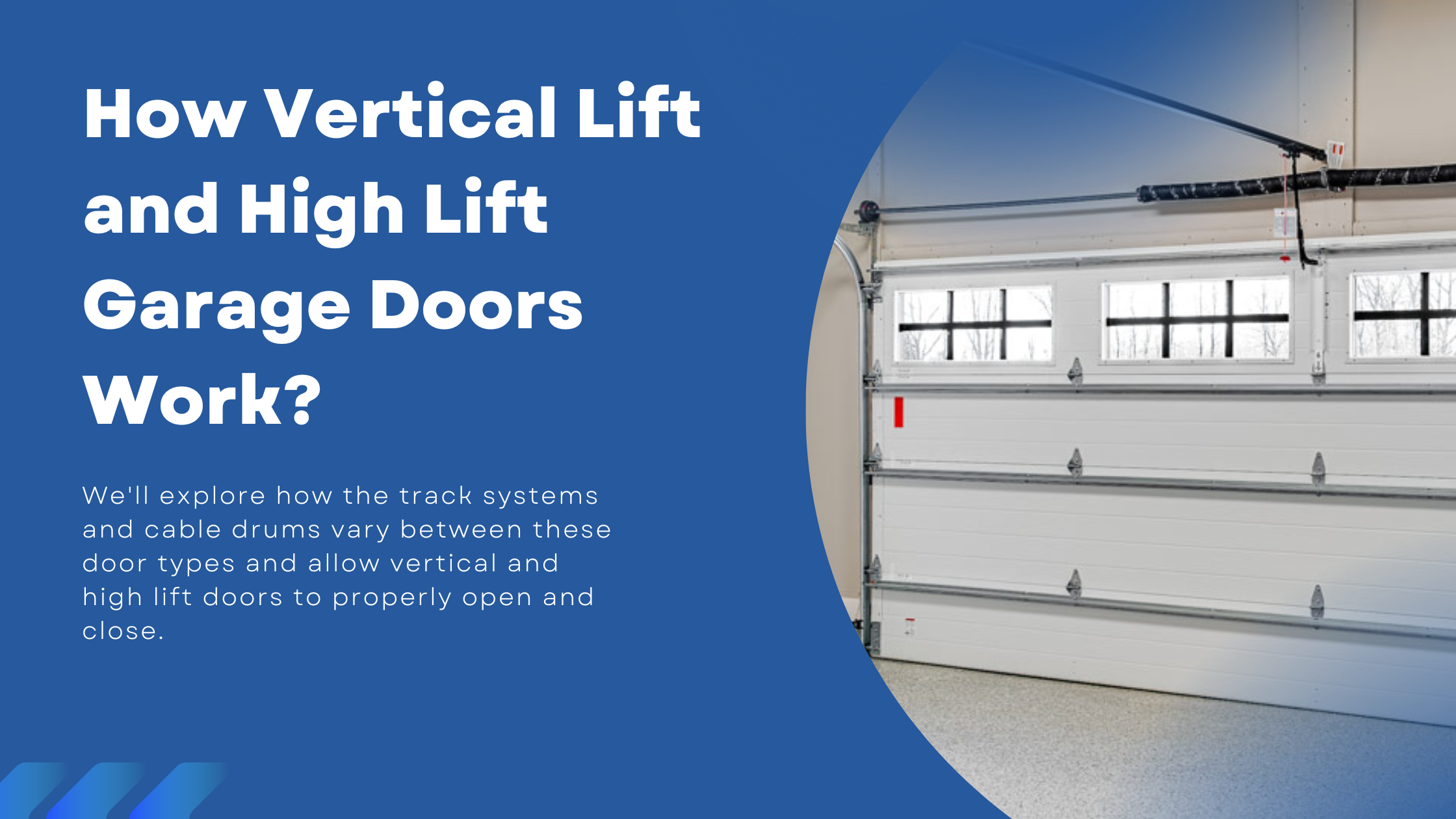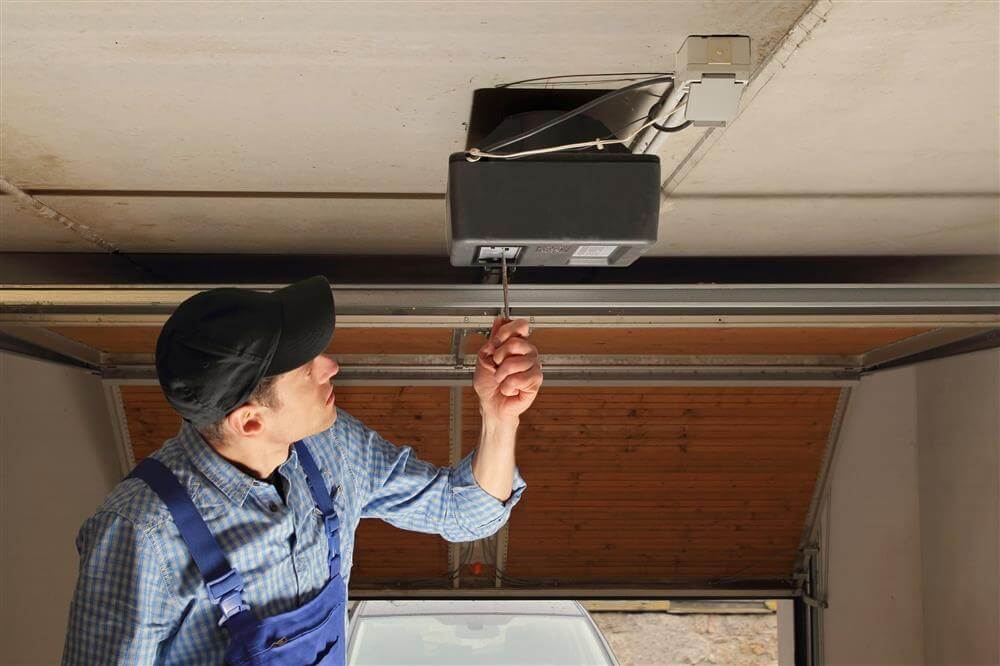




Are you looking to replace your aging garage door with something new? Vertical lift and high lift garage doors operate very differently than standard lift doors and provide unique benefits. In this post, we’ll dive into the key differences and how the specialized engineering of vertical and high lift doors allows them to open overhead rather than outwards.
There are several types of garage doors, but most residential garage doors are sectional doors that operate with torsion springs on the shaft above the door. Standard lift garage doors open outwards with curved tracks before going vertical.
Vertical lift and high lift garage doors work differently – they utilize straight vertical tracks to open directly upwards. This allows full use of the space inside and above the garage door opening.
We’ll explore how the track systems and cable drums vary between these door types and allow vertical and high lift doors to properly open and close.
There are two major differences that set vertical lift and high lift garage doors apart from standard lift doors:
Standard lift garage doors have curved tracks that angle the door outwards initially before transitioning to vertical. This uses interior space near the door for the swing out motion.
Vertical lift tracks are completely straight with no curve. The door simply travels straight up the track to open overhead.
High lift doors have a longer straight vertical portion of track before the curved section. So the door still opens outwards slightly before going vertical.
Since vertical lift and high lift doors open differently, they require different cable drums to balance the door properly.
Standard lift drums are flat so the cable winds around at a constant distance from the center shaft.
Vertical lift drums are tapered or cone-shaped. As the door opens, each wrap of cable winds closer to the shaft.
High lift drums start as tapered before flattening out like a standard drum.
These specialized cable drums are essential for the doors to operate safely and with proper spring tension.
Vertical lift garage doors utilize an angled track that sits close to the rear wall of the garage. When closed, the door rests on the concrete floor as a wedge, with the bottom slightly farther back than the top.
As the automatic opener or manual lift engages, the torsion springs unwind and the door travels directly upward along the vertical tracks. This opens the door overhead and fully utilizes the height of the garage.
Since vertical lift doors open straight up without curving out, the engineering of the cable drums is critical.
As the door opens, the distance between the cable and center shaft (the moment arm) gets shorter. This decreases the effective leverage from the torsion springs.
At the same time, the springs are unwinding and losing lifting force. This reduction in leverage and lift needs to be properly balanced with the weight of the door as it opens.
That’s why vertical lift drums continuously wind the cable closer to the shaft. It compensates for the loss of leverage and spring tension, keeping the door balanced.
Converting an existing standard lift door to vertical lift requires replacing the curved track with new vertical tracks. The standard lift cable drums must be replaced with tapered vertical lift drums. Springs may need adjustment as well.
Kits are available for professional installation of vertical lift conversions on many standard residential doors. Always have a qualified garage door technician handle the conversion.
High lift garage doors work similarly to vertical lift doors but with key differences:
The tracks have a longer vertical section before curving out slightly. This allows more clearance above the opening.
The cable drums start as tapered before leveling out like a standard drum.
When the door first engages, it travels vertically upwards just like a vertical lift door. The initial tapered portion of the cable drum provides proper leverage and spring tension.
Once the top section of panels reaches the curved horizontal portion of track, the door then starts to swing out slightly.
At this point, the weight is transferred from the springs to the horizontal tracks. That’s why the cable drum levels out – the spring lift no longer has to fully support the door.
The longer vertical track section allows high lift doors to clear higher obstacles and utilize the full height of the garage.
This makes them ideal for garages with low headroom clearance or when you need to mount equipment high on the ceiling.
High lift garage doors can also accommodate higher vehicles like SUVs, trucks, and boats when fully open.
Like vertical lift conversions, switching an existing door to high lift requires installing new tracks and cable drums designed specifically for high lift operation.
Many residential high lift conversion kits are available. Always use a trained garage door technician for this type of major door modification.
While the operation varies, vertical lift and high lift doors integrate similar safety features as standard lift doors:
Proper installation and routine maintenance are crucial for ongoing safe operation of any garage door.
Purchasing and installing a new vertical or high lift garage door costs more than a standard lift door, often several thousand dollars or more.
Converting an existing door to vertical or high lift also has a higher price tag, normally $800-$1500 for parts plus professional installation fees.
Factors affecting the overall project cost include:
Operation is smoother and quieter than old-fashioned extension spring doors. Well engineered vertical lift and high lift doors have long service lives of 20-30 years.
Vertical lift and high lift garage doors operate very differently than standard lift doors. Straight vertical tracks and uniquely designed cable drums allow the door to open overhead rather than swinging out.
This engineering allows full utilization of ceiling height and space inside the garage. It also provides added clearance for vehicles and storage.
While costs are higher, vertical and high lift doors provide a smooth, quiet operation and maximized clearance. If your garage needs to make the most of available height, vertical or high lift garage doors are an excellent option.

We have a wide range of services including garage door installation, tune-ups and repairs. We also offer replacements for any broken or malfunctioning mechanism on site!
Our Support and Sales team is available 24 /7 to answer your queries